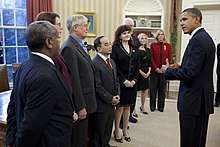Teresa Woodruff
| Teresa Woodruff | |
|---|---|
| Alma mater | Olivet Nazarene University, Northwestern University |
| Occupation | |
| Employer | Northwestern University |
Teresa K. Woodruff is an American medical researcher in human reproduction and oncology, a faculty member of the Feinberg School of Medicine at Northwestern University in Chicago, Illinois. She is credited with coining the term oncofertility and founded the Oncofertility Consortium at Northwestern Memorial Hospital.
Education
Woodruff graduated with a Bachelor of Science degree in Zoology and Chemistry from the Olivet Nazarene University in 1985.[1] She did her graduate study at Northwestern University, graduating with a Ph.D. in Molecular Biology and Cell Biology in 1989.[2]
Career
Oncofertility research

In 2006, Woodruff introduced the term oncofertility and has "been at the center of the movement ever since."[4] With a $21.5-million National Institutes of Health grant, she launched the Oncofertility Consortium at the Northwestern Memorial Hospital to work on implications of cancer on reproductive medicine.[5][6]
On March 28, 2017, her team at Woodruff Lab announced the creation of Evatar, a miniaturized female reproductive tract made from tissues taken from humans and mice, as well as other mechanical components.[7][8][9]
In September 2017, Woodruff was selected as Editor-in-Chief of the journal Endocrinology, assuming that role after Andrea Gore's term elapsed.[10]
Educational work
Woodruff created Repropedia in 2010, a dictionary of reproductive terms, created and updated by science and clinician contributors.[11][12]
While a vice chair for research in obstetrics and gynecology at Feinberg School of Medicine at Northwestern University[13] in September 2015, she launched a sex education course targeted at new college students. The series of videos describe the interaction between behavior and the human reproductive system, as well as biological function. Some of the subjects covered in the course include how a woman's menstrual cycle can be affected by a relocation and how a man can experience erectile dysfunction after consuming a few alcoholic beverages.[14]
In an article published by The Verge on August 8, 2018, six hours after this Wikipedia article was created, Woodruff is referenced as an example of one of many "prominent scientists who aren’t featured on Wikipedia," and whose work was identified by an AI-programmed tool designed to crawl scientific studies and lay media sources to draft articles about the most frequently mentioned individuals.[15]
References
- ↑ "Olivet alumna Dr. Teresa Woodruff recognized as inventor". Olivet Nazarene University. April 16, 2018. Archived from the original on August 8, 2018. Retrieved August 8, 2018.
- ↑ "Curriculum Vitae T.K. Woodruff" (PDF). Woodruff Lab. August 1, 2018. Archived (PDF) from the original on August 20, 2018. Retrieved August 19, 2018.
- ↑ Zacharias, Maria (December 14, 2011). "President Obama Honors Outstanding Science, Math and Engineering Mentors". NSF.gov. National Science Foundation. Archived from the original on August 20, 2018. Retrieved August 20, 2018.
Women's Health Science Program for High School Girls and Beyond, Northwestern University Feinberg School of Medicine, Ill., represented by Teresa Woodruff
- ↑ Rindner, Grant (September 27, 2015). "BTN LiveBIG: Northwestern brightens future for female cancer patients". Big Ten News. Archived from the original on September 27, 2015. Retrieved September 27, 2015.
- ↑ Rochman, Bonnie (October 11, 2010). "Fertility and Cancer: Surviving and Having Kids Too". Time. ISSN 0040-781X. Archived from the original on September 11, 2016. Retrieved August 8, 2018.
- ↑ Bowen, Alison (February 1, 2016). "Cancer and kids: Young women explore fertility options". Chicago Tribune. Archived from the original on August 13, 2018. Retrieved August 13, 2018.
- ↑ Lant, Karla (March 30, 2017). "A New Menstrual Biochip Could Revolutionize Treatments For Reproductive Diseases". Futurism. Archived from the original on June 12, 2017. Retrieved April 2, 2017.
- ↑ Rogers, Adam (March 28, 2017). "Scientists Build a Menstrual Biochip That Does Everything But Bleed". WIRED. Archived from the original on August 13, 2018. Retrieved August 12, 2018.
- ↑ Knapton, Sarah (May 18, 2017). "Fresh hope for infertile women after live births using 3D-printed ovaries". Stuff.co.nz. Retrieved May 17, 2017.
- ↑ "Woodruff named Editor-in-Chief of Endocrinology". Endocrine Society. September 6, 2017. Archived from the original on August 10, 2018. Retrieved August 10, 2018.
- ↑ Stevens, Heidi (September 29, 2015). "Birds, bees and beers: Sex Ed 101 arrives at Northwestern". Chicago Tribune. Archived from the original on August 8, 2018. Retrieved August 8, 2018.
- ↑ "About Repropedia". www.repropedia.org. Archived from the original on August 20, 2018. Retrieved August 19, 2018.
- ↑ Preidt, Robert (July 3, 2017). "'Cycle in a Dish' Explores Female Intricacies". KESQ. Archived from the original on August 8, 2018. Retrieved July 4, 2017.
- ↑ "Northwestern offers Sex 101 for freshmen, public". ABC7 Chicago. September 28, 2015. Archived from the original on September 29, 2015. Retrieved September 28, 2015.
- ↑ "AI spots 40,000 prominent scientists overlooked by Wikipedia". The Verge. August 8, 2018. Archived from the original on August 9, 2018. Retrieved August 11, 2018.
External links
- Teresa Woodruff publications indexed by Google Scholar